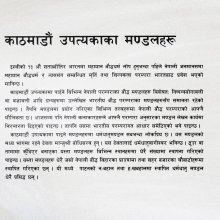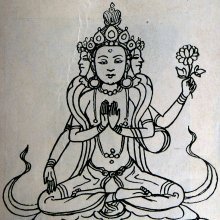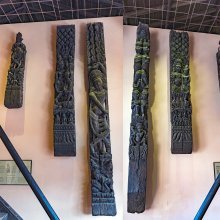Disappearance, Disappear, Disappeared, Disappearing: 2 definitions
Introduction:
Disappearance means something in Hinduism, Sanskrit. If you want to know the exact meaning, history, etymology or English translation of this term then check out the descriptions on this page. Add your comment or reference to a book if you want to contribute to this summary article.
Images (photo gallery)
In Hinduism
Yoga (school of philosophy)
Source: ORA: Amanaska (king of all yogas): A Critical Edition and Annotated Translation by Jason BirchDisappearance (of breathing) is denoted by the Sanskrit term Lopa, according to the Yogatārāvalī: a short Yoga text of twenty-nine verses presenting Haṭhayoga as the means to Rājayoga (i.e., Samādhi).—Accordingly, while describing the no-mind state: “We see the Amanaska Mudrā manifesting in [those] most eminent sages because [their] breathing has disappeared (niśvāsa-lopa), [their] bodies are firm and [their] lotus-eyes are half closed”.

Yoga is originally considered a branch of Hindu philosophy (astika), but both ancient and modern Yoga combine the physical, mental and spiritual. Yoga teaches various physical techniques also known as āsanas (postures), used for various purposes (eg., meditation, contemplation, relaxation).
Shaktism (Shakta philosophy)
Source: Google books: Genesis and Development of Tantra (Shaktism)Disappearing (power) is denoted by the Sanskrit term Antardhāna and represents one of the various Supernatural Powers (siddhi) according to the Siddhayogeśvarīmata: an ancient Sanskrit text devoted to cults of Goddesses as the Vidyāpīṭha or Vidyā Corpus.—In the Siddhayogeśvarīmata, the objectives of rituals are classified as siddhis [e.g., disappearing (antardhāna)]. They belong to the category of supernatural phenomena and seem to be considerably different from the types of wish people expected to gain from the Vedic rituals that still remained within the sphere of everyday life.

Shakta (शाक्त, śākta) or Shaktism (śāktism) represents a tradition of Hinduism where the Goddess (Devi) is revered and worshipped. Shakta literature includes a range of scriptures, including various Agamas and Tantras, although its roots may be traced back to the Vedas.
See also (Relevant definitions)
Query error!
Full-text (+1441): Antardhana, Adarshana, Lopa, Vyaya, Vinashta, Tirodhana, Antarhita, Tirohita, Vinasha, Nashta, Lupta, Vilina, Vilopa, Luk, Vinashana, Tirobhava, Nas, Parabhava, Pranashta, Apagama.
Relevant text
Search found 501 books and stories containing Disappearance, Disappear, Disappeared, Disappearing, Disappears; (plurals include: Disappearances, Disappears, Disappeareds, Disappearings, Disappearses). You can also click to the full overview containing English textual excerpts. Below are direct links for the most relevant articles:
Maha Prajnaparamita Sastra (by Gelongma Karma Migme Chödrön)
Part 2 - Preventing the disappearance of the holy dharma < [Chapter LII - Elimination of the Triple Poison]
Act 1.6: Definition of trisāhasramahāsāhasralokadhātu < [Chapter XIV - Emission of rays]
2. Debate with the Personalist < [Part 13 - Non-existence of the donor]
Patthana Dhamma (by Htoo Naing)
Chapter 26 - Natthi paccayo and vigata paccayo (or absence and disappearance)
Chapter 27 - Avigata paccayo (or non-disappearance condition)
Mandukya Upanishad (Gaudapa Karika and Shankara Bhashya) (by Swami Nikhilananda)
Mandukya Karika, verse 1.17 < [Chapter I - Agama Prakarana (Scripture)]
Mandukya Karika, verse 1.23 < [Chapter I - Agama Prakarana (Scripture)]
Mandukya Upanishad, verse 12 < [Chapter I - Agama Prakarana (Scripture)]
Tattvasangraha [with commentary] (by Ganganatha Jha)
Verse 223-225 < [Chapter 7 - Doctrine of the Self (ātman, ‘soul’)]
Verse 16 (refutation of the Sāṃkhya Doctrine) < [Chapter 1 - Examination of the Doctrine of Primordial Matter (prakṛti)]
Verse 414 < [Chapter 8 - Examination of the Doctrine of the Permanence of Things]
Mahabharata (English) (by Kisari Mohan Ganguli)
Three Facts In The World What The Buddha Taught (by Ven. Sayadaw Ashin Intaka)
Related products
(+5 more products available)









